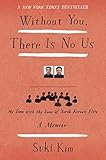Speech Critique:
Suki Kim (TED 2015)

This article reviews the 2015 TED talk by Suki Kim about her experience living undercover as a teacher for six months in North Korea.
Aside from the powerful core message, Kim’s talk also has several speaking lessons for us, including:
- how to read a speech without being flat and emotionless
- how to use pauses effectively
- how to align words with facial expressions to convey emotion
- how to make every word count
This is the latest in a series of speech critiques here on Six Minutes.
I encourage you to:
- Watch the video;
(If it does not appear below, watch it here.) - Read the analysis in this speech critique; and
- Share your thoughts on this presentation in the comment section.
Lesson 1: You can read a speech.
What is your first response when you see a speaker reading their speech? Are you expecting it to be engaging? Boring? Flat?
When you choose to read your speech, you accept certain disadvantages:
- The lectern acts as a barrier, making it harder to connect with your audience.
- Body movement is limited by virtue of needing to stay close to the printed words on the page.
- Eye contact is reduced.
- Air flow is restricted (due to a lowered head), which limits the resonance of your voice.
But, it is possible to deliver an effective speech while reading, and Suki Kim demonstrates this by compensating in a variety of ways:
- Her preparation is obvious. At many times throughout the speech, she had clearly committed the words to memory, and didn’t need to rely on the page.
- She uses pauses expertly, and varies the pace of her vocal delivery.
- Her face and eyes convey a great deal of emotion.
- Her writing is so strong, and her story is so powerful that I forgot she was even reading after the first minute or two.
Could this speech have been even better without reading it? Perhaps. I sense that isn’t really Suki Kim’s strength, however. She chose to read this speech, and this speech was undoubtedly very effective.
Lesson 2: Master the pause.
Too often, TED speakers (and all speakers) tend to rush their delivery. The strict time constraint tempts them to speak faster to “fit all their content in” rather than ruthlessly edit their material.
Suki Kim, on the other hand, gives a perfect demonstration of how to use effective pauses. Consider the opening 73 words of her speech which include nine lengthy pauses:
In 2011, [pause]
during the final six months of Kim Jong-Il’s life, [pause]
I lived undercover in North Korea. [pause]
I was born and raised in South Korea, their enemy. [pause]
I live in America, their other enemy. [pause]
Since 2002, I had visited North Korea a few times. [pause]
And I had come to realize that to write about it with any meaning, [pause]
or to understand the place beyond the regime’s propaganda, [pause]
the only option was total immersion. [pause]
Note the significant words immediately preceding the pauses. By pausing as she does, Suki Kim allows the weight (and significant contrast) of these words to linger in the minds of her audience:
- “North Korea”, “their enemy”, “their other enemy”
- “any meaning”, “regime’s propaganda”, “total immersion”
I can’t recall any other speech where the speaker used pauses more effectively. I encourage you to listen to this entire speech, focus on the pauses, and learn from her skill.
Lesson 3: Be expressive.
Reading a speech tends to blunt the emotions of speakers, resulting in monotone and expressionless delivery.
Suki Kim avoids this pitfall. Indeed, she expresses many intertwined emotions: love, frustration, confusion, hatred, regret, friendship. Her words contribute to conveying the emotion, too, but that’s the point! Her words were in perfect harmony with the expressions she conveyed through her voice, eyes, and facial expressions. As just one example, note her expressions on the video during the following passage very near the end of her speech:
[~ 9:10] Once, toward the end of my stay, a student said to me, “Professor, we never think of you as being different from us. Our circumstances are different, but you’re the same as us. We want you to know that we truly think of you as being the same.”
By sharing such honest, raw emotions, Suki Kim helps the audience feel these emotions too.
Lesson 4: Make every word memorable.
The advantage of reading your speech is that every word can be carefully crafted, and every phrase you write will reach your audience, untainted by a potentially faulty memory. As a professional writer, the strategic use of words is Suki Kim’s strength, and her speech is packed with dozens of evocative phrases.
Consider just a few of the examples quoted here.
Example 1
I was born and raised in South Korea, their enemy. I live in America, their other enemy.
The emphasis on “enemy” is powerful, especially as the second and third sentences in the speech. These are the sentences which Ms. Kim uses to introduce herself to her audience—as an enemy of North Korea. By mentioning America, she pulls her audience into this “enemy” relationship.
Example 2
I went there looking for truth. But where do you even start when an entire nation’s ideology, my students’ day-to-day realities, and even my own position at the universities, were all built on lies?
Note the contrast between “truth” and “lies”.
Example 3
North Korea is a gulag posing as a nation.
Everything there is about the Great Leader. Every book, every newspaper article, every song, every TV program — there is just one subject. […]
The school was a heavily guarded prison, posing as a campus.
“North Korea is a gulag posing as a nation” may be the most powerful sentence in her speech. The repetition of “posing” a few sentences later (in “posting as a campus”) emphasizes this.
Repetition of the word “every” at the beginning of successive phrases is anaphora, a powerful rhetorical device.
Example 4
But something also felt wrong. During those months of living in their world, I often wondered if the truth would, in fact, improve their lives. I wanted so much to tell them the truth, of their country and of the outside world, where Arab youth were turning their rotten regime inside out, using the power of social media, where everyone except them was connected through the world wide web, which wasn’t worldwide after all.
I love the use of “world” and “world wide” here.
The figure below shows the most commonly used words in her speech.

More from Suki Kim’s Memoirs
If you’d like to know more about Suki Kim’s 6-month experience undercover in North Korea, I recommend Without You, There Is No Us: My Time with the Sons of North Korea’s Elite.
The book is a New York Times bestseller.
Jon Stewart, during an interview with Suki Kim on The Daily Show said:
It’s a book like no other book that I’ve ever read. It’s a look into a society, into a culture, but […] objective and humanizing and terrifying.
What do you think?
What did you think of this speech? What are the best aspects of this speech? How could this speech have been made even better?
Please share your thoughts in the comments.
Please share this...
This article is one of a series of speech critiques of inspiring speakers featured on Six Minutes.
Subscribe to Six Minutes for free to receive future speech critiques.
Subscribe - It's Free!
| Subscribe via Email | |
| Subscribe via RSS | |
| Follow Us |
|
Similar Articles You May Like...
Find More Articles Tagged:
 9 Comments
9 Comments
 Recent Tweets
Recent Tweets
Make every word count… @6minutes https://t.co/Uz0ctweae1
— @jameswendt Sep 29th, 2015
Revisión de una charla: Suki Kim TED 2015 [en]: http://t.co/PCn4J8FjbI /de 6minutes #presentaciones Vía ArtePresentar
— @Mundo_U Sep 30th, 2015
Speech Critique: Suki Kim (TED 2015) https://t.co/aHxObJ13Gm
— @dennisdturner Oct 5th, 2015
Never read your presentation… unless you read it like @sukisworld : Speech Critique: Suki Kim TED 2015 http://t.co/S9kRU8jsCE by @6minutes
— @manolofrias Oct 5th, 2015
Suki Kim’s 4 Speech Lessons http://t.co/1ctOsuT3rl
— @imjessharris Oct 9th, 2015
Speech Critique: Suki Kim (TED 2015) http://t.co/f6kqJZjy5d
— @allankarl Oct 13th, 2015
Speech Critique: Suki Kim (TED 2015) http://t.co/DmqCzBcTIF
— @Digital_Tavern Oct 14th, 2015
Speech Critique: Suki Kim (TED 2015) https://t.co/88Aw5PRvaO by @6minutes
— @tjwalker Oct 27th, 2015
Retweeted TJ Walker (@tjwalker):
Speech Critique: Suki Kim (TED 2015) https://t.co/aRzYHzBzp1 by @6minutes https://t.co/fqim2gSh2I
— @RobZebrowski Oct 27th, 2015
Speech Critique: Suki Kim (TED 2015) https://t.co/rWTKGWDrX5 by @6minutes
— @AyeshPerera4 Aug 7th, 2018



















Thanks for the critique, Andrew. I agree she read her speech well, and she used pauses and eye movements to great effect.
For me, a few aspects severely hampered the speech though. For instance, when the music started, I didn’t see the players in the background, and first thought the sound was coming from another browser window. I found it very distracting, and wondered if the organisers didn’t think the speech would be enough by itself.
Also, despite the speech being written in advance, I didn’t find it very clear in some ways. For example, it was only near the end that she said she was teaching English, so until then I’d assumed she must’ve spoken Korean while under cover. Hence, during most of her speech I was wondering why her anglicised accent didn’t blow her cover.
Anyway, I appreciate you showing that reading a speech isn’t necessarily a fatal flaw, and the huge power of pauses.
If you’d be interested, please also see this detailed critique of a TEDx talk on body language. I’d love to hear your views.
Craig: I loved your detailed speech critique. Wonderful analysis with lots of practical advice.
The body language and the music brings emotion. I love it!
opening grabbed our attention. the body of the speech was connected very well. ending not good. don’t say thank you at the end,Use some analogies. north Korea made me as welcome and a bacon sandwich at a bar mitzvah. overall great job , looking forward to you net speech not being read
Good hook at the opening. You earned the right to tell this story. You lived it . Why do you need to read it? You hhhave the stage every speaker wants. Move around use gestures , use analogies.Examaple No korea made me as welcome as a bacon sandwich at a bar mitzvah. Ending pop a balloon and say my friendships made with the students will never end
SUKI DELIVERED A SPEECH THAT GOT OUR ATTENTION RIGHT FROM THE START. THE READING OF THE SPEECH DID NOT DETRACT FROM IT. I LOST SOME INTEREST IN THE MIDDLE OF THE SPEECH. THIS IS JUST MY PERSONAL OPINION .. I think it might have ben more interesting if you told your experience in the form of a Pixar story . once upon a time there was…… because of this…….. just a suggestion. Mason
This speech was powerful because she lived it. Personally I don”t know why she used notes. It would have meant a lot more with no notes. Suggest take a memory course. Mason
Its not the yearsin your life that count………..Its the life in yhour years said Abraham Lincoln. After listening to Suk Kim’s ll speech she has lead a purposeful life. You reduced unwanted stag e movement which helped in which helped in having a n effective eye contact with the audienc I felt. YHou revised vocal variety several times in the body of youre speech to d eliver yhoure statements with impact You have recycled our in thusianm in lerning more abot your e livexperience in No korea. Suggestions next time add a little humor o the sp;eech Im sure y ou could find some humor in your experience .. Great job look forward ttho hearing more of youre speeches.
I really liked the techniques used in this speech. The use of pauses and rhetoric device was subtle and engaging.
It was emotional – conveyed in the voice, facial expression and words – ie “they blushed at the mention of girls”
I felt the emotional listening to the speech and it made me think about people and how they become who they are.
I would have liked to hear a call of action at the end. Thanks